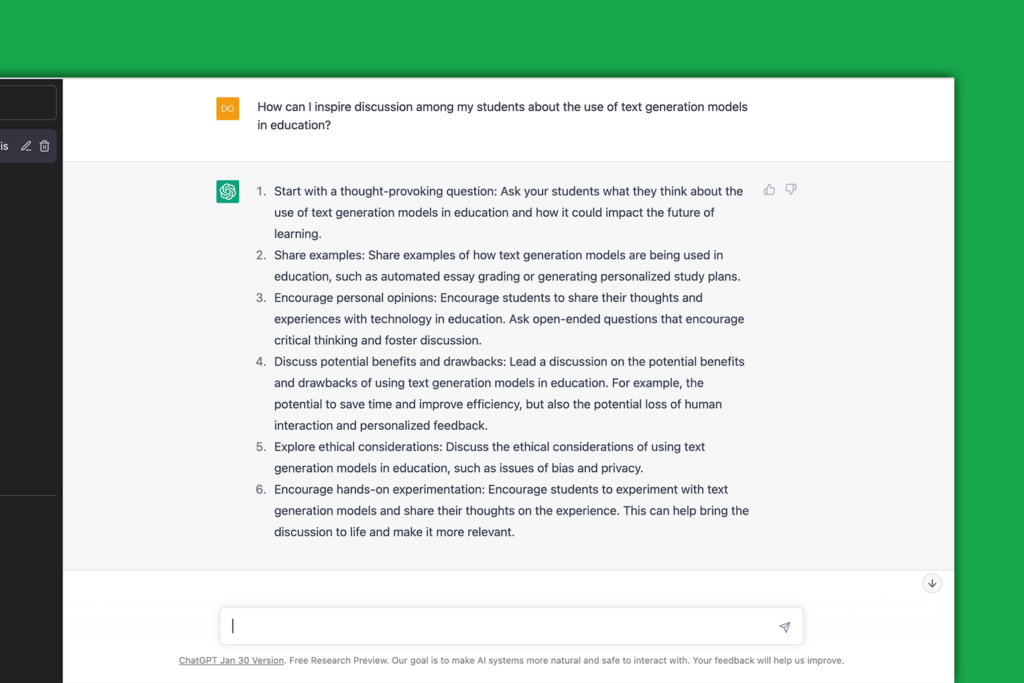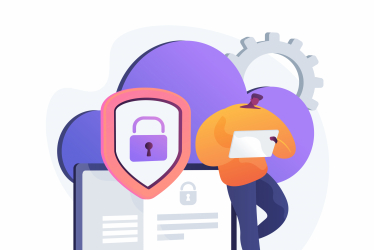Insights
Explore ChatGPT’s Potential for Higher Ed: Try Our Hands-On Exercise
AI chatbots are the hot topic of the moment. Their impressive ability to generate human-like text has sparked many discussions focused on the the risk that students might use these new tools to cheat on assignments.
At LLInC we acknowledge the challenges — and we’ve shared ways to adjust assignments accordingly. At the same time, we see fantastic potential to use AI chatbots as support tools. With the right prompts, teachers, students, researchers and university staff can use them to work more efficiently and discover new perspectives on topics and tasks.
To help you learn more, we’re sharing a hands-on exercise that will help you to quickly spot opportunities and limitations. The exercise was originally written for ChatGPT but can also help you to test out other AI chatbots.
Direct experience is important in order to have rich and informed conversations about the impact of these technologies in education. By seeing things in action, you’ll better understand how it can — and cannot — be used.
This exercise focused on ChatGPT and is aimed at people without much experience using it.
If you’re already regularly exploring ChatGPT, you may skip directly to the discussion questions. It’s always worth reflecting. We’d love to hear your ChatGPT impressions!
ChatGPT: Exploring Use Cases for Education
In this exercise you’ll play around with ChatGPT so that you better understand how it can be used in higher education. First you’ll try out some basic prompts with different end users in mind. Next, try ChatGPT as an assistant for your daily work tasks. Finally, have a free-form chat conversation on a topic that interests you.
Before you dive into the exercises, navigate to https://chat.openai.com. Create an account if you’re a new user. Because of the high interest in ChatGPT, it might be at full capacity when you try to access it. If so, simply try again later.
Part 1: Try out prompts and explore use cases for different users
We’ve created sample prompts for you. Use them to empathise with different perspectives and possible uses. If you’re a teacher: do these prompts help you to see how ChatGPT could help students? Are you inspired to use ChatGPT in your courses?
Play around with the prompts. Feel free to rephrase sentences to reflect your interests, or come up with your own prompts.
Student Prompts:
- Explain the purpose [CONCEPT] in [FIELD]
- Provide examples of how [CONCEPT] is used
- Summarise main ideas behind [SUBJECT]/[CONCEPT]
- Describe how [CONCEPT1] and [CONCEPT2] are related
- Create a study plan for [SUBJECT]
- Summarise key points from [BOOK]/[PAPER]
- Generate practice problems and solutions for [CONCEPT]/[SUBJECT]
- Discuss the history and development of [CONCEPT]
- Provide a step-by-step plan to research [TOPIC] / write [ESSAY] / create [PROJECT]
- Create flash cards for [SUBJECT]
- Define all technical terms and definitions related to [SUBJECT]
- Generate examples of applications of [SUBJECT]/[CONCEPT]
- Provide detailed actions needed to solve [PROBLEM]
- Write the main resources needed for learning [SUBJECT]
- Rewrite [TEXT] such that it has the same tone and fix any mistakes
Teacher Prompts:
- Propose assessments that are not affected by students using ChatGPT in [SUBJECT]
- Develop a list of prompts that students can send ChatGPT to learn about [SUBJECT]
- Generate a sample lesson for teaching [TOPIC]
- Create quiz/homework assignment/project for students to assess their understanding of [TOPIC]/[CONCEPT]
- Propose discussions questions for students on [TOPIC]
- Develop a list of recommended resources for [SUBJECT]/[TOPIC]
- Write slides for a presentation/lesson about [CONCEPT]/[TOPIC]
- Write a syllabus for [SUBJECT] class
- Generate a list of class readings for [SUBJECT]
- Identify main concepts that students have difficulty understanding in [TOPIC]

Researcher Prompts:
- Generate a list of keywords related to [TOPIC]
- Provide an overview of current research on [TOPIC]
- Summarize key finding of [PAPER]
- Provide a list of relevant academic journal for publishing research on [TOPIC]
- Provide a list of related studies or research on [TOPIC]
- Write a literature review for [PAPER]
- Provide a list of relevant funding opportunities for research on [TOPIC]
- Generate a list of research question for a study on [TOPIC]
- Create a step-by-step plan to write a paper to answer [RESEARCH_QUESTION]
- Provide a list of tools and software that aid in researching [TOPIC]
- Create survey about [RESEARCH_QUESTION]
- Write a research proposal outline about [TOPIC]
- Provide a list of ethical consideration for a study about [TOPIC]
- Write abstract/introduction/conclusion about [RESEARCH]
- Create a research plan and timeline for [RESEARCH]
Part 2: Use ChatGPT as your work assistant
On a regular work day, open ChatGPT on a second display for the whole day. Whenever you are performing a specific task, ask it for help. For example, you might ask:
- How can I do [TASK]?
- Write a [DETAILED/OVERVIEW/ETC] step-by-step instruction on how to perform [TASK]
- Provide different best options/best practices to perform [TASK]
Even if you know how to perform the task, ChatGPT might provide different approaches or help you to do the task more efficiently.
Part 3: Discuss a topic with ChatGPT
Have a longer free-form chat with ChatGPT about something that interests you. You can also use it on your phone, so this might be a good task when you are commuting or waiting for an appointment. For example, you can ask it to tell you a joke or recommend a book based on your favourite authors or genres. You can also discuss philosophical or ethical questions with ChatGPT.
Reflecting on your experience
Now let’s take some time to reflect.
- Did ChatGPT give you new insights on the topics you asked it about?
- Are you inspired to integrate ChatGPT into your educational program, course or daily work? If so, how?
- What is your biggest doubt or concern?
We’d love to hear your answers to these questions. You are welcome to share your thoughts anonymously in our WooClap. If we get enough replies, we will share them in a future blogpost.
You might also discuss your ChatGPT experience with others. Do they have other interesting ideas for using ChatGPT? How do they see this type of technology being used within education?
Reading list: challenges and opportunities of ChatGPT for education
In Dutch
- Collegecolumn: ChatGPT, een bedreiging of een kans? (Leiden Universiteit)
- ChatGPT – verzameling bronnen (SURF)
- De invloed van ChatGPT op toetsing: kun je nog take-home tentamens en essays gebruiken? (Utrecht University)
In English
- ‘Full-on robot writing’: the artificial intelligence challenge facing universities (The Guardian)
- Executive Board column: ChatGPT, threat or opportunity? (Leiden University)
- Educator considerations for ChatGPT (OpenAI)
- Op-Ed: Don’t ban chatbots in classrooms. (Los Angeles Times)
- The influence of ChatGPT on assessment: can you still use take-home exams and essays? (Utrecht University)




